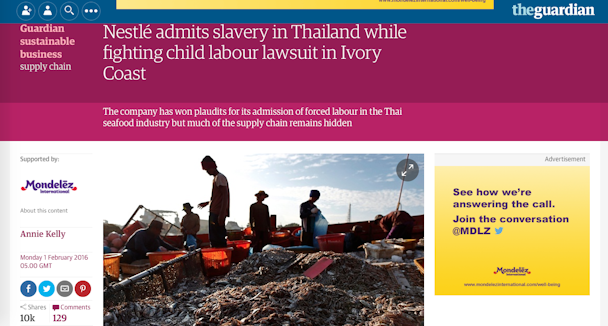Mondelez has sponsored a negative story on the Guardian about its rival Nestlé
Mondelez has funded a negative story on the Guardian about its rival Nestlé but insists it had no say in what the subject matter was.

The story in question sees Nestlé admit that its customers have been buying products tainted with the “blood and sweat of poor, unpaid and abused migrant workers”.
Headlined ‘Nestlé admits slavery in Thailand while fighting child labour lawsuit in Ivory Coast’, the story is funded by Mondelez as part of its ‘call for well being’ sustainability push.
It might seem like Mondelez has pounced on an opportunistic moment to prosper on the misery of its rival, though the business stressed this is not the case.
As with other sponsored deals, Mondelez said it did not have any say in the writing of the Guardian’s story, an arrangement that’s key to its partnership with the publisher since its inception last November. This is backed by the Guardian’s own guidelines which stipulate that the difference is in the labelling of said content; if a story is marked ‘supported by’ then the advertiser has no control over the coverage, whereas if badged 'paid content'or 'paid for by' are controlled by the advertiser rather than the publisher.
Nestle declined to comment on the issue, though it did point to a comment from Magdi Batado, its executive vice-president in charge of operations, that ran in the story. He affirmed the company's position on tackling child labour and the work we are doing on this area.
The incident spotlights the challenges both publishers and advertisers are trying to overcome in their attempts to master native content. While many respect that there needs to be a ‘church and state’-style separation between editorial and ad-funded content, accusations from some quarters of the industry insist that the two are blending too much.
Last year, the Telegraph's stance on this was brought into sharp focus when one of its former journalist’s admitted that it had allowed its coverage to be influenced by an advertiser.
For Mondelez, the incident is an unfortunate side effect of being more open to trying to test new advertising mediums before its rivals. In 2014, the UK’s advertising regulator rapped the company’s Cadbury brand for not clearly labelling a YouTube video it had funded. Months later the chocolate maker produced another series of YouTube ads and claimed it had learned its lesson.

